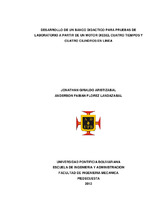| dc.contributor.advisor | Castellanos Olarte, Javier Mauricio | |
| dc.contributor.author | Giraldo Aristizabal, Jonnathan | |
| dc.contributor.author | Flórez Landazábal, Anderson Fabián | |
| dc.coverage.spatial | Seccional Bucaramanga. Universidad Pontificia Bolivariana. Escuela de Ingenierías. Facultad de Ingeniería Mecánica | spa |
| dc.coverage.temporal | 2012 | |
| dc.date.accessioned | 2015-01-27T16:25:54Z | |
| dc.date.available | 2015-01-27T16:25:54Z | |
| dc.date.created | 2013-05-07 | |
| dc.date.issued | 2015-01-27 | |
| dc.identifier.uri | http://hdl.handle.net/20.500.11912/2065 | |
| dc.description | 73p.: (pdf); il; gráficas; tablas; anexos | spa |
| dc.description.abstract | El estudio del ciclo diesel en las aulas de clase es de gran importancia, pero para complementar el aprendizaje teórico es necesario realizar prácticas de laboratorio con un motor real, ya que con él se puede comprender en totalidad todos los elementos mecánicos y eléctricos necesarios para obtener energía mecánica a partir de la energía química del combustible, máxime si se tiene en cuenta que muchos de los estudiantes nunca han manipulado este tipo de motores. El proyecto permitió desarrollar un banco de pruebas con un motor diesel de cuatro tiempos y cuatro cilindros en línea, refrigerado por agua, con características muy similares a los que se encuentran en la industria. Con él los estudiantes se familiarizarán con el funcionamiento e identificarán los diferentes elementos mecánicos y eléctricos de esta máquina térmica. El motor utilizado está soportado en una estructura metálica, que cuenta con tres gavetas y cerradura para guardar componentes del equipo y los elementos necesarios para realizar las prácticas, como herramientas, empaques, probetas, báscula, cronómetro y manual del motor. | spa |
| dc.description.abstract | It is very important the study of the diesel cycle in the classroom, but to complement this theoretical learning is quite needful do a laboratory test RIG using a real diesel engine, because with this one they can understand all mechanic and electric pieces necessary to get mechanical energy from chemical energy of fuel, all of that having present that most of the student have not handled this kind of engines.
This project allowed develop a test Rig with a 4 cycles, 4 cylinders in line and water cooled diesel engine, whose features are similar to other machines, which can be found in the industry. With this one the students could understand and know how it works and identify all their mechanical and electrical pieces. The engine is on a metallic structure and got three drawers with padlocks to keep the pieces that are part of the engine and the necessary tools to do the laboratory work. | |
| dc.language.iso | es | |
| dc.publisher | Universidad Pontificia Bolivariana | spa |
| dc.rights | Attribution-NonCommercial-NoDerivatives 4.0 International | * |
| dc.rights.uri | http://creativecommons.org/licenses/by-nc-nd/4.0/ | * |
| dc.subject | Tesis y disertaciones académicas | spa |
| dc.subject | Evidencia | spa |
| dc.subject | Laboratorios | spa |
| dc.subject | Motor diesel | spa |
| dc.subject | Tecnología mecánica | spa |
| dc.subject | Energía mecánica | spa |
| dc.title | Desarrollo de un banco didáctico para pruebas de laboratorio a partir de un motor diésel cuatro tiempos y cuatro cilindros en línea | spa |
| dc.type | bacherlorThesis | spa |
| dc.rights.accessRights | openAccess | spa |
| dc.type.hasVersion | publishedVersion | spa |
| dc.identifier.instname | instname:Universidad Pontificia Bolivariana | spa |
| dc.identifier.reponame | reponame:Repositorio Institucional de la Universidad Pontificia Bolivariana | spa |
| dc.identifier.repourl | repourl:https://repository.unab.edu.co/ | |


